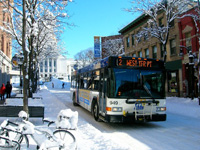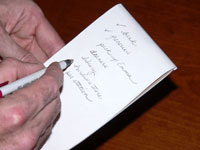Winter Tips
Do A Little, Save A Lot
Whether staying indoors around the fireplace or enjoying outdoor activities, air quality and energy remain important parts of winter life.
Daily use of electricity and fuel contributes to air pollution. The choices we make every day can directly affect air quality and human health.
The outside temperatures are dropping, but energy bills do not have to skyrocket. Each year the average family spends $1,165 on energy bills. By making a few energy-saving home improvements or eco-friendly, everyday decisions, the average American can stay warm, reduce emissions and save money all at the same time this winter.
In The Yard
In The Yard
Look no further than the yard for ways to improve air quality. Consider these air pollution prevention tips.
- Use a shovel instead of a snow blower. Snow blowers use gasoline and/or electricity, both of which add pollutants into the air.
- Use LED holiday lights to decorate the yard. These lights last 10 times as long and use 93% less energy as standard incandescent mini-lights.
- Consider planting shrubs or evergreen trees to serve as a windbreak. Keeping the wind from blowing through the house will save energy and keep the heat in the home.
In The Home
In The Home
Efficient home energy use reduces air pollution caused by energy production. Reducing the use of air-polluting products can also help repair the air.
- Looking to make some energy-efficient improvements to your home? Visit the Focus on Energy Home Energy Rebate page for information on currently available rebate programs and upcoming federally funded rebate opportunities.
- During the heating season, keep the shades on all south facing windows open during the day to allow sunlight to enter the home, and closed at night to reduce the chill from cold windows.
- Keep the fireplace damper closed when not in use. Have a fireplace, but don’t use it? Use a chimney pillow. A fireplace acts like a straw in a house, sucking out the heat and replacing it with cold air and sometimes smoky smells. Chimney pillows provide insulation to fireplaces, keeps the heat in and the cold drafts out.
- Minimize the use of space heaters and gas fireplaces. They are more inefficient and expensive to operate than furnaces when trying to heat the majority of a home.
windows open during winter
days to let in the sun.
- Use LED holiday lights to save on energy bills. LED lights last 10 times longer and use up to 93% less energy than standard incandescent mini-lights.
- Conserve energy by turning off lights when leaving a room and turning off computers and televisions when not in use. Also, unplug gadgets, phone chargers, coffee pots and other electronics. They draw electricity even when turned off.
- Have the furnace inspected and serviced annually. Replace the furnace filter regularly. A dirty filter slows down airflow and makes the system work harder. A clean filter keeps dirt from building up and can save costly repairs.
- The lower the home thermostat is set, the more money is saved. According to the Department of Energy, for every degree the thermostat is lowered, the heating bill will lower by 1% to 3%.
- Check the water heater's thermostat.If it is set above 120 degrees, the water could cause third-degree burns in less than 10 minutes. Turn down the thermostat for safety and to save energy.
- Seal holes and cracks in the basement with expandable foam or silicone caulking. Insulate hot water pipes and heating ducts in the basement.
Video
This video shows ways to save energy around the house.
Travel And Commute
Travel And The Daily Commute
public transportation.
- Biking and walking to work in the winter can be challenging, but public transportation is a good alternative.
- Idling can consume as much as a gallon of gas per hour and is not an effective way to warm up your vehicle. The best way to warm up a vehicle is to drive it. Waiting to pick up a student from school? Turn off the engine to save fuel and reduce fumes in the school yard.
- When driving, anticipate stops and slow down gradually. It takes 20% less gas to accelerate from 5 miles per hour than from a full stop.
- Slow down when driving and use cruise control to minimize fuel use.
- Remove unneeded items from the trunk! The weight of that extra cargo makes engines work harder, burns more gas and releases more emissions.
- To learn more about choosing a greener vehicle and minimizing environmental impacts visit
Video
Learn some eco-driving tips in the video below.
At Work
At Work
quality at work.
There are many ways to improve air quality while at work. Here are a few tips.
- Turn off the computer, printers, fax machines and lights at night to save energy. Consider putting electronics on a power strip so they can all be turned off at once.
- Rather than traveling to a meeting, hold meetings by telephone or video conference, especially during an air quality advisory.
- Bring lunch to work instead of driving to get it.
- Consider a compressed work week. Working four 10-hour days eliminates one round trip every week. Also, traffic may be less congested when traveling during off peak hours.
- Take mass transit, share a ride or carpool. Doing so reduces emissions.
Green Gift Giving
Green Gift Giving
buying them.
- Look for gifts with little or no packaging, or packaging that can be easily reused or recycled.
- Home make gifts instead of buying them.
- Make Your Own Paper [exit DNR] for gift wrapping or holiday cards. For additional paper making activities visit Project Leaning Tree.
- Give gifts that help friends and family live greener, such as bus tickets, state park passes, compost bins, reusable grocery bags, rechargeable batteries and chargers, live plants and seeds or coupons for spring gardening.
- Reduce waste by wrapping gifts in comics, reusable cloth, old maps or artwork drawn on scrap paper. Or make the wrapping part of the gift. For example, wrap a kitchen gift in a hand towel or put jewelry in a pair of gloves.
- Show support for recycling by purchasing gifts made of recycled material.
- Purchase a real tree instead of an artificial one. Most Wisconsin trees are locally grown and sold, while at least 95% of artificial trees are imported. Real trees are easily composted or mulched after the season. Or buy a potted tree and add it to the home’s landscape in the spring.
While Shopping
leaving the house.
- Do some research, make a list and check it twice before heading out to find that perfect gift. Being prepared will save driving all over town. Researching gifts also reduces fuel use for gift-return trips.
- Trip chain. Combine errands and makes them all in one, well-planned trip.
- Buy local. Buying local gifts reduces fossil fuels burned during transport.
- Bring reusable bags to the stores while shopping to reduce the use of disposable bags.






